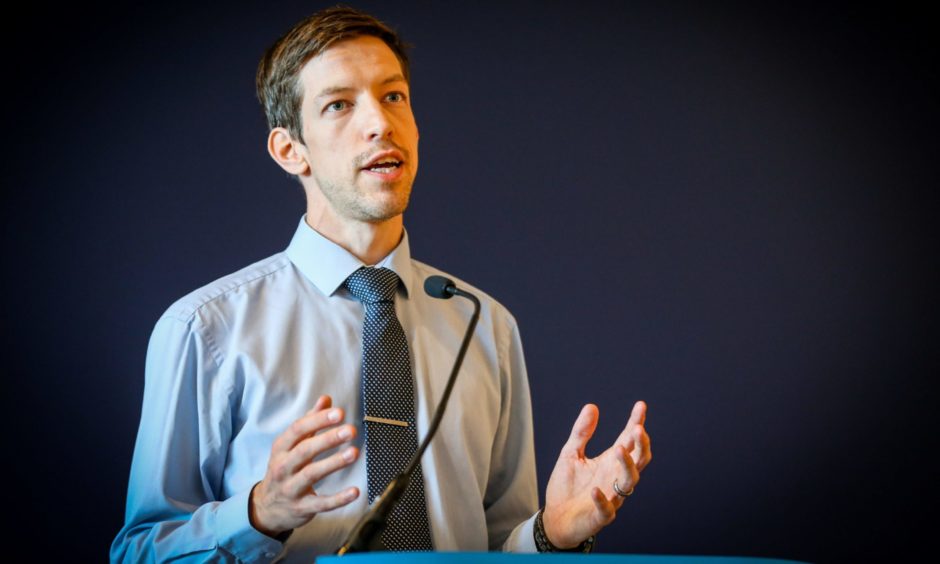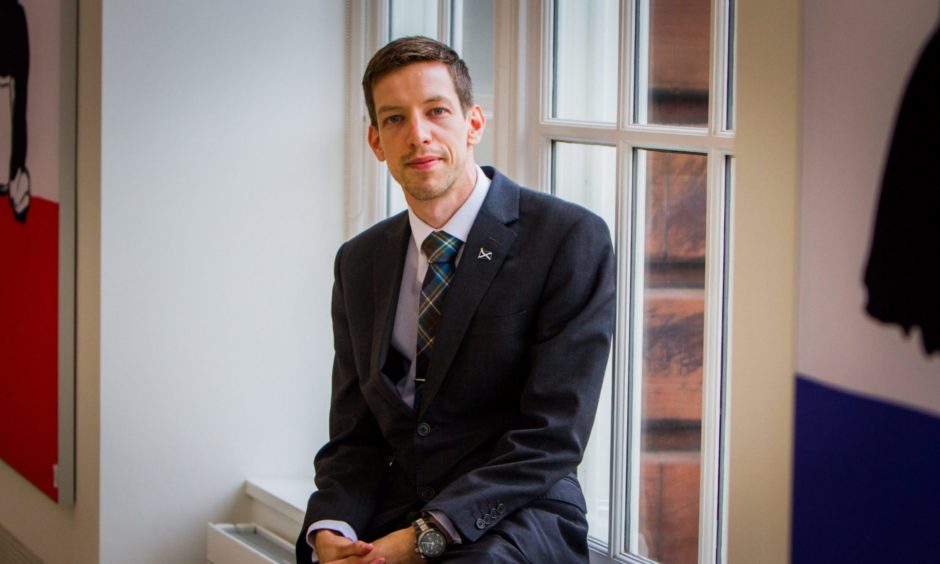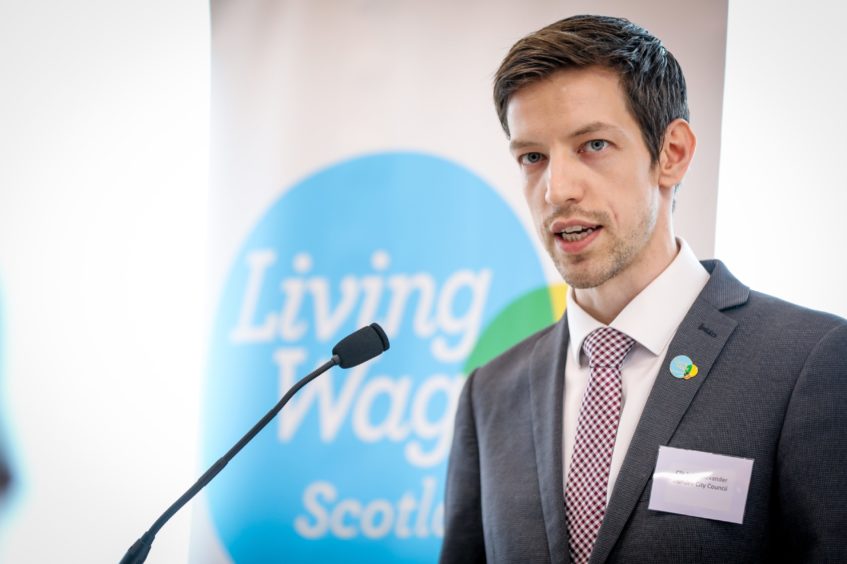A 24-hour mental health crisis service could be operational “within the realm of a few months”, it is hoped.
Dundee City Council leader John Alexander said that while a physical drop-in service may not be ready in that timeframe, a 24/7 phone line for people to call when they are in a crisis could be set up.
The Strathmartine SNP councillor that while he would like to see the service up-and-running “tomorrow”, realistically it would take more time to properly man the service, with partners including NHS Tayside, the Integrated Joint Board (IJB) and the third sector all involved.
Mr Alexander said the model currently used in Edinburgh – where a phone service is manned by the mental health charity Penumbra – could be an option for Dundee.
It comes after calls from Labour councillor Michael Marra to “fast-track” the service, with the Lochee member writing to the council’s chief executive Greg Colgan to share his fears about the “gathering storm” likely to affect the mental health of thousands of young people across the city.
City mental health campaigners believe a 24-hour centre – where a person in a mental health crisis can go for help without a medical referral – could save lives.
However, Mr Alexander was wary of rushing any service, saying the partners involved must make sure the service is fit for purpose.
Unanimous support
He said: “Firstly, I think it is really important to recognise that there is unanimous support, so this has been agreed by Dundee City Council in its entirety.
“Every single politician that is represented on the council has agreed, and supports, a 24-hour crisis centre.
“Myself and the council’s lead on health and social care matters, councillor Ken Lynn, have been vocal supporters, but also have had meetings of late with people such as Kate Bell, who coordinates and lead the work for NHS Tayside, Vicky Irons, who heads up and leads the IJB, and also the chief executive of Dundee City Council as well.
“So we are as keen as anybody to see the development of a facility.
“I think also it’s important to say that it’s a test of change, so the model that exists in Edinburgh, they have a 24/7 phone line, it’s not a drop-in facility, you don’t turn up at the door and access crisis facilities like that. You access a phone number and then there’s a bit of triage to identify what services you actually need.
“And it might well be at the crisis centre, or it might be at clinical, or it might be something else.
“So there is a triage facility, I’ve pushed very hard, as have Ken Lynn and others, to make sure that we’re able to take that forward fairly rapidly.
“I think there’s something to be said for a transitional arrangement, so we might have an all-singing, all-dancing model, and whatever that looks like, but in the meantime, I don’t see any reason that we couldn’t have a more transitional arrangement to test some of the approaches that have been developed in Edinburgh and elsewhere, and to see how it works in a Dundee context.”
Impact of coronavirus
Mr Alexander said that if that a centre was the model Dundee wanted to adopt, a lead charity would need to be identified to operate the service.
He also said the coronavirus pandemic had had a significant impact on getting any crisis service operational.
He said: “It’s really important to recognise that the officers that are working on this and taking it forward are also the same officers that are dealing, on a daily basis – and have been for the past year – with Covid-19.
“We couldn’t possibly have created that kind of facility in the past 12 months because it’s a face-to-face type of facility. That wouldn’t have been able to operate because of lockdown measures and restrictions.
“So, we’ve lost a bit of time because of the situation that we’ve been in, but we all absolutely want to see this accelerate and rapidly be delivered.
“Fundamentally we’ve been dealing with a pandemic. It’s not easy to create a facility that is people-facing when you’re not allowed to go out and set up those types of facilities or operate them.
“We all want to see the crisis centre and we want to see it tomorrow, but we’ve also got to acknowledge that the people who are trying to deliver this are also dealing with the consequences of Covid-19. So, there has to be a little bit of recognition there, I think.
“But, I absolutely think there could be transitional arrangements that we could set up, I don’t think it would take that long to set up that type of transitional facility.
“If you look at the scale of the crisis centre is in Edinburgh, it’s very small, but what it does is really acts as an opportunity for people to contact when they feel like they’ve got nowhere else to go, and for them to receive the support that’s appropriate for them.
“Because it’s not always at the clinical side, it’s not always the folk from NHS Tayside that are the most appropriate support at that time.
“It might well be that it’s the charitable side of things, or the community support that’s more important – it just depends. Mental health is such a wide spectrum that the needs of each individual will be completely different.”
The council leader said that the premises where a physical centre could be housed was not important, it was about “getting the right people with the right expertise and skills who can help people in crisis”.
Plenty of options
He added that current mental health support services could be used as a starting point.
“You don’t have to build something from scratch, I think we’ve got plenty of options to take that forward,” he said.
“There’s a model in play in Edinburgh that we can replicate, but that doesn’t mean that model is perfect, we might actually want to improve on it, we might want to build more, or we might want to adapt it slightly.”
Mr Alexander noted that the charity which runs the call service in Edinburgh, Penumbra, also operates in Dundee, along with a host of other mental health charities.
Meeting people’s needs
“If we’ve got something currently that we can adapt to meet the expectations and the needs of people then let’s do that, let’s not always take so long that we need to plan and start from scratch,” he said.
“If we can adapt what we’ve got in play right now, then that is the quickest way of getting that successful model into play, so it’s not just a phone line, it’s all those various bits.
“It will also be the third sector and charities, so we need to make sure we have that fully fleshed out, because the worst thing for me is, if we started something or we created something, and it didn’t deliver what people needed it to deliver.
“We need to get it right, but we need to do it quickly and make sure that we’re not taking too long to get it to implementation.”
Mr Alexander said that as far back as April last year the topic of a crisis centre had been on the agenda and he recognised there was an urgent need for a 24/7 service, which had only been worsened by the coronavirus pandemic.
“We were already dealing with a serious mental health issue across Scotland, across the UK, across the globe in fact,” he said.
“And it’s been exacerbated by Covid-19. Hopefully, the end is in sight, with the vaccination programme and stuff, we can all see a glimmer of light at the end of it – but that doesn’t mean that the impact of mental health is suddenly going to go away.”
Mr Alexander said the Scottish Government’s additional funding of £250 million to support mental health was “really welcome”.
Not a council facility
He continued: “This isn’t all in the council’s hands.
“We (the council) can be banging our fists off the table, but we’re only one cog in that giant wheel.
“We need the IJB, the NHS, and third sector partners to all play their part in making that a reality, so I can bang the drum as hard as I want, but I’m just one part of it, we need all of the players to play an active role.
“And it’s fair to say they are – the conversations I’ve been involved in with officers across those organisations and politicians have been really positive.
“Councillor Michael Marra and councillor Ken Lynn were in a meeting recently with NHS Tayside on mental health and were both saying the exact same thing, so I don’t think there is any ambiguity about our ambition or what we want to see, it’s just making sure that we’re pushing it as hard as we can.”
Within the realm of a few months
When asked if a service such as a 24/7 phone line could be set up in weeks, the council leader said: “The number of partners you’re looking at, I wouldn’t want to necessarily put a direct timeframe on it, but I think it would be within the realm of a few months you’d be looking at to set that up, because you’ve got to think about practicalities, job descriptions, and getting a facility that does it justice up-and-running.
“But, absolutely within the window of a few months, I would hope that we’ve got something in play that actually does it justice – what our calls have been for the last period of time.”
A progress report on plans for a 24/7 crisis centre will be given to the Dundee Health and Social Care Partnership Integration Joint Board next month.


